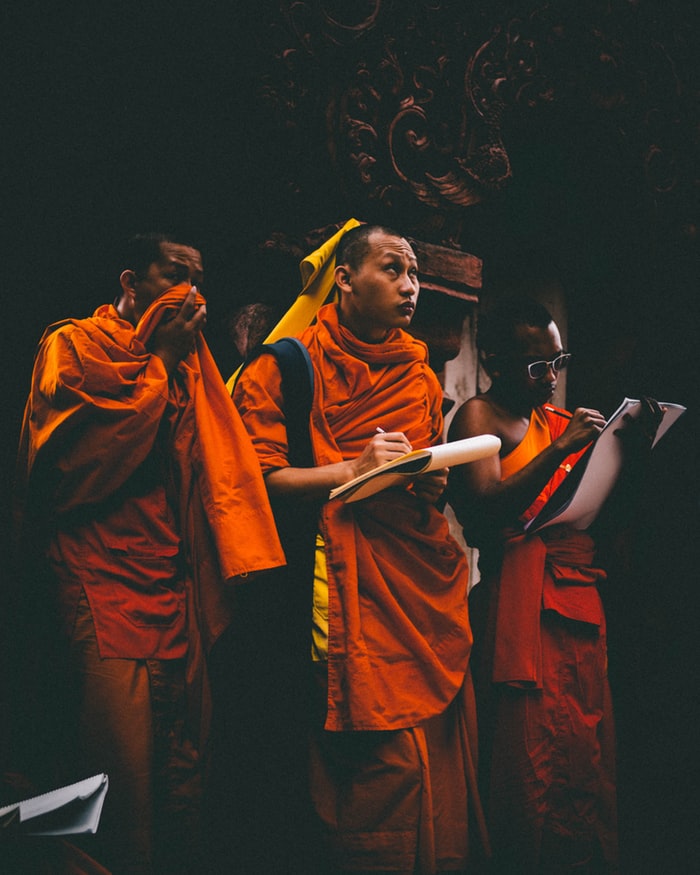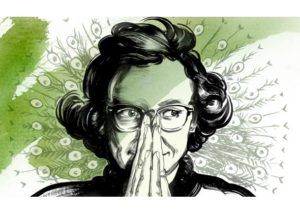Learning to Write about Religion
You, too, might be a religion writer.

Photo by Sacha Styles
“Writing about religion is both freeing and scary.” Laura Ferris
On a gray fall morning in a Queens College classroom, I ask the students in my Writing about Religion class to take out a piece of paper and write about what it’s like to write about religion. I tell them I’m working on a piece about it, and I’d love their help thinking it through. As they settle into their thoughts, the room grows quiet, and I see their heads bowed over their work as if in prayer.
“I was nervous because I didn’t know what to expect. [But] once the class started and we began our assignments I fell in love with the class. I like being able to write about my own religion because it is so personal. It has given me lots of opportunities to self-reflect.” Katarzyna Szmuc
 We started the semester by reflecting on what we think religion is. I’ve taught this class many times, and on the first day I always bring in a bag of objects for my students to ponder: a book of yoga poses, a dollar bill, a colander, a tiny bottle of High John the Conqueror oil, a sprig of mistletoe, a box of incense with a lotus on the label, a box of Manischewitz matzo ball mix, a plain Goya-brand novena candle from the bodega or one with a picture of the Golden Girls on it from Etsy … I ask the students to choose an object and work together in pairs to come up with answers: What are some reasons why it might be religious, and some reasons why it might not be? Afterwards we all discuss: Is “religiousness” inherent in an object itself, or does it reside in the object’s use? Is religion reliant on community, or personal intention, or tradition, or labeling? Can satire be religion? Or commerce? Or pop culture? Their answers vary, and I write them all on the board.
We started the semester by reflecting on what we think religion is. I’ve taught this class many times, and on the first day I always bring in a bag of objects for my students to ponder: a book of yoga poses, a dollar bill, a colander, a tiny bottle of High John the Conqueror oil, a sprig of mistletoe, a box of incense with a lotus on the label, a box of Manischewitz matzo ball mix, a plain Goya-brand novena candle from the bodega or one with a picture of the Golden Girls on it from Etsy … I ask the students to choose an object and work together in pairs to come up with answers: What are some reasons why it might be religious, and some reasons why it might not be? Afterwards we all discuss: Is “religiousness” inherent in an object itself, or does it reside in the object’s use? Is religion reliant on community, or personal intention, or tradition, or labeling? Can satire be religion? Or commerce? Or pop culture? Their answers vary, and I write them all on the board.
One year, a student improvised a spell on the spot, anointing the dollar bill with High John oil after she googled to find out who High John was and how conjuring worked. I felt a twinge of secular anxiety in that moment, alongside a sense of wonder. Should a creative writing class be a place where we interrogate our assumptions about religion, or a place where we learn to cast spells? Or both?
“When it came to the initial thought of writing about religion in class it was a bit nerve wracking. Religion has always been a touchy subject and gets touched with a 10 foot pole often. … I never want to come off ignorant or pushy so I only bring up my religion when asked about it. … I was interested to hear about other people’s walks with religion. Was it long? Was it short? Is the walk still happening? Did you two sit on a bench and take a break? You learn a lot from other people’s experiences and stories and that’s what really help[s] motivate me to keep telling my stories.” Kayla Saxton
At the midpoint in a semester of writing about religion, the students have listened to Harry Potter and the Sacred Text, a podcast that models its textual interpretation on the Jewish practice of havruta (study partners) and the Catholic practice of Lectio Divina (monastic textual reading), and they have applied these ways of reading to texts that are sacred to them: an autographed novel by Maaza Mengiste, a Top-40 song, and a red envelope covered with good luck messages in Chinese characters. They have read Mary Antin’s migration memoir and Flannery O’Connor’s prayer journal; they have read religious coming-of-age stories by Langston Hughes, Laila Lalami, and Jia Tolentino; and they have watched a documentary film by Zareena Grewal about Mahmoud Abdul-Rauf, the NBA player who converted to Islam and then refused to stand for the national anthem. They have interviewed classmates and family members and friends. And they have written personal essays about doubt and grief and memory and joy; essays illuminated by church candles on sale for ena dolário and household shrines bedecked with gold velvet and Bic lighters. Soon they will write presentations on visits they make to sacred sites. And they will embark on research essays in which they will seek answers to questions that might not have answers.
“It’s like soul searching without physically going anywhere. It’s like yourself, your spiritual self, is being discovered, being understood.” Isabella Costa
“Stories travel.” This is the reassurance my graduate school advisor gave me when I was worried about writing about literary traditions other than my own. I see religious stories and forms traveling across time, space, and religious traditions in the texts my students and I read together, and in the ways we use these texts to write stories ourselves.

Flannery O’Connor
In the prayer journal she kept as a student in her early twenties, Flannery O’Connor expressed her Catholic faith and doubt in the traditionally Protestant form of extemporaneous prayer, writing informal epistolary entries addressed to “My Dear God.” Later, my friend Ashley and I wrote an essay in response to hers, in the form of letters to God, Flannery, and each other. (I’ve been reliably informed that I’m relentlessly Protestant, and Ashley, the child of a Coptic Christian father from Egypt and a Pentecostal mother from Alabama, identifies as “Copticostal.” Like O’Connor, we both believe in borrowing the religious and literary forms we need.)
“I do not mean to deny the traditional prayers I have said all my life; but I have been saying them and not feeling them.” Flannery O’Connor
A hundred years ago, Mary Antin repurposed stories about the Exodus and the Promised Land to tell a story about fleeing pogroms in Eastern Europe and going to public school in Boston as a secular Jew. Antin’s stories traveled from the Pale to the U.S., and now I see them traveling through the work of a student who cites Antin as an influence, and whose own story brought her from China to the U.S., from Buddhist altars to an altar of language:
“Seemingly, the Chinese have constantly recorded their ideologies into books of prayers and chants, to have language ground their belief—to somehow give it tangibility. During this semester, our class did something similar. We collected our ideologies, specifically our religions, and tied them down to our writing. Though we took it one step further through reflective reinvention. Language is perhaps the most tangible, yet abstract, medium—almost ideological itself. Perhaps, what we did was substitute one ideology for another. In other words, substituting religion [with] a belief that exists outside the sphere of any systematic ideology we had previously been tied down to. When I was younger, religion was mandatory, severe, and repressive. By taking control and writing about it, religion has been replaced by something else—by a reinvention of a religion into a liberated belief outside of any type of familial or national conditioning.” Amanda Long
Writing about religion encompasses stories of deracination and alienation as well as their opposite: the literal racination of anointing with oil distilled from a root. Especially at a college where a third of the students were born outside the U.S. and two thirds have parents who were born outside the U.S., writing about religion often involves a reckoning with origins both national and existential.
“On a simple piece of paper, the pen glides through, embedding all my feelings into words. Ink splatter[s] throughout the paper as it spills my thoughts and emotions. It allows me to find my deeper feelings and understand who I am as a person. Writing about religion has humbled me and allowed me to touch base with my faith. It leads me back to my origins, and remind[s] me of who God is and what my faith teaches. Throughout this course, I have learned a great deal about who I am and how I want to embody Islam.” Maria Sultana
I ponder the histories that brought us all here. Recently or long ago, our families found their way to New York City from China, Colombia, the Czech Republic, the Dominican Republic, Germany, Greece, Guyana, Honduras, Korea, the Netherlands, the Philippines, Poland, Puerto Rico, Trinidad, and elsewhere. In Queens I am often conscious of my status as a white Protestant in a country that has been settled and dominated by white Protestants, in a borough and on a campus where most people are neither Protestant nor white. There are many chasms between my experience and my students’—chasms that I sometimes marvel at, and sometimes try to bridge. In many ways, we are so different from each other. But for all of us, religion has been a thread that connected us across continents, or tangled, or snapped. It has been braided with new threads or left to fray.
“Why do I pray? Why do I fast? Religion writing demands asking questions and investigation.” Zainab Gani
Like I did at their age, and like many college students, my students are reckoning with a religious inheritance that may seem tenuous or overwhelming or sometimes both. As a college student, I often felt estranged from my two worlds: the evangelical subculture I was leaving behind, and the secular world around me that seemed stripped of meaning. My religious struggle was not a crisis of piety or belief but a crisis of community. I had no trouble praying or affirming creeds, but I couldn’t imagine a permanent place for myself in a religious world where women were expected to marry young and submit to men, and where women could not become scholars or writers. I survived that time by writing myself through it. When I felt brave enough, I’d try to write myself towards or away from something. I’d write to uncover and discover.
“It really challenges you to think deeper. Not only on your own but also [with or about] your family.” Ivana Cruz
Unlike many people in this country, but like most of my students, I lived with my family during college. Writing was my privacy and my escape. By going to a secular college and pursuing an academic career, I was slowly writing myself out of a community that practiced excommunication and shunning of wayward women—a community my family had made their life in for decades. I felt that writing had the power to free me, but I didn’t yet know what I was writing myself into.
“The experience was cathartic. The ability to get your own feelings out and ask all these important questions everyone asks but are too afraid to admit it is something very enchanting.” Elisabeth Mercado
 I wrote to God, I wrote to my professors, I wrote to no one. Like some of my students, I didn’t have a computer. When I was writing to meet deadlines, I stayed up late at a communal computer on campus, sipping surreptitiously from some smuggled-in caffeine, fueling my papers on Louisa May Alcott and Frederick Douglass with the restlessness of my faith and doubt. At home in bed as I lay with my notebooks, I wrote words over and over in a self-soothing trance that felt like transcribing glossolalia, channeling syllables in flowing ink that turned language into shapes and lines. Lifelines.
I wrote to God, I wrote to my professors, I wrote to no one. Like some of my students, I didn’t have a computer. When I was writing to meet deadlines, I stayed up late at a communal computer on campus, sipping surreptitiously from some smuggled-in caffeine, fueling my papers on Louisa May Alcott and Frederick Douglass with the restlessness of my faith and doubt. At home in bed as I lay with my notebooks, I wrote words over and over in a self-soothing trance that felt like transcribing glossolalia, channeling syllables in flowing ink that turned language into shapes and lines. Lifelines.
“Writing about religion this semester has been difficult. However it has been so therapeutic for me because of my experiences, which were not all good. Writing about it has helped me reevaluate my relationship with it and put some of my hateful experiences in perspective.” Qadeera Murphy
For me and for some of my students, religion has sometimes been an encounter with hate. How do we find the courage to resist the rules that would condemn us? I was told that sex outside of heterosexual marriage made women as worthless as crumpled paper. I was able to embrace my life as a fallen woman when I decided my body was as god-breathed it in scripture. I decided to live as if my experience was a source of authority. Writing about religion requires a sense of one’s own authority.
“My self and experiences that I had are the sources and proofs of my writing.” Eunice Chang
Treating one’s experience as a sacred text to ponder and to wrestle with, or as a ritual to reinvent: This is the work of an essayist and a memoirist. It might also be the work of any religion writer. What you have witnessed, you must testify. In a world full of libraries and search engines, your own varieties of experience are still evidence. Your experience of libraries and search engines is evidence too.
“To write about religion means to write from the heart, to be truthful and transparent. I think it has little to do with persuasion, rather it serves as a testimony/recollection of one part of a person’s life. … It brings perspective.” Jaylin Yee
My testimony is that after a turbulent time in my teens and twenties, when my religious life was in chronic crisis and my writing life was punctuated by panic attacks, I arrived at a tenable truce in both. I’m now an amateur believer, a professional writer, and midwife to the writing of others. My writing no longer feels like spirit writing. Instead it feels like a daily service that must be rendered, as comforting and tiring as any other ritual practice that feels both optional and not.
“Having faith in something … It brings people a lot of comfort but also a lot of frustration.” Maggie Chen
The best writing advice I ever received was from a graduate school professor who told me to write out of a sense of unease. I’d already been doing this all my life, but she gave it the stamp of approval I needed. I tell my students that uneasily mixed feelings are a writer’s gift, and nothing creates more mixed feelings than religion. One of the taglines of Killing the Buddha, the publication I co-edit, is “a religion magazine for people made anxious by churches.” Are you exasperated by the smell of incense? Are the prayer beads in your palm getting slick with sweat? Does the sound of a Hammond organ start to dissolve your own organs? Maybe you, too, might be a religion writer.
Or maybe your unease is the unease of homesickness, and an uncertainty about where home might be.
“I’ve felt the urge to want to connect with religion. I distanced myself and had doubted God because of all the faults I have made. Writing made me realize that I do believe in God and have faith. It is challenging because although I want to reconnect myself with religion, I don’t know if it’ll be as a Catholic. … I am open to anything.” Chelseajoy Cabrega
Not all my students are on a personal religious quest. Many end up taking the class because it fulfills a writing requirement and fits with their work schedules. Some use it as a way of learning about their friends or neighborhoods. Others take the opportunity to write about their pre-existing interests in The Handmaid’s Tale or astrology or digital art. Regardless of why they are here, I want them to have the time and opportunity to find their visceral curiosity and write from it. In the midst of long commutes and long days, I want their writing to make them feel alive. I want them to be thinking about their research questions as they stand and sway on the subway. I want them to experience their own uncertainty as a place to begin.
“I always figured that in order to write about religion, you need to know your views the way you know the back of your hand. I’ve found that this is actually not true.” Nick Armont
For the past two weeks the back of my hand has been recovering from a burn that turned it brown, then fuchsia. For a while the skin swelled like a water balloon and then it collapsed and wrinkled like an elephant’s hide. I can’t give a clear account of my religious views, and I don’t know the back of my hand at all. Some people write to find out what they know. It’s also worth turning to writing as an alternative to knowing.
“I’ve truly come to believe none of it and all of it. So now my question isn’t why people believe or what they believe, but how they believe in just one thing.” Allison McFarlane
How do other people believe what they do? How do they pray as they do, and eat as they do, and desire as they do, and mourn as they do? How do they live? These are questions that express a desire for connection, and they motivate so much of what my students and I have read together: Zora Neale Hurston apprenticing herself to a practitioner of hoodoo in New Orleans; Ellen Willis arguing with her Orthodox family in Israel; James Baldwin sitting down to a meal with Elijah Muhammad. These questions express a desire to understand others beyond the self, even and especially when they mystify us most. They are outward looking in a way that I aspire to be when I think about writing and religion. My own religion writing started with my internal struggle, and it has turned into a social practice. I wrote a syllabus that starts with writing about ourselves, and ends with research about the world around us. But of course this is a false dichotomy: because writing is a conversation between multiple voices, a dynamic between different worlds and selves.
“Most of the time it feels LOVELY to hear [about] the lives of other people. I learn a lot from others when they speak of their lives. But sometimes it can feel very difficult to speak about myself and the things I’ve dealt with. What really resonates with me is to hear my classmates’ stories and how they have dealt with hardship much worse than mine. This class teaches me how to figure out my religion while observing and respecting other religions. And with the multiple stories we read, I can say I’m getting closer to becoming a much more peaceful and accepting person.” Antonio Martinez
Eleven years ago, I thought God might be calling me to be an academic chaplain—a minister to college students. I applied to academic jobs and divinity schools and decided to let God decide. God chose Yale Divinity School, where for two years I trained to minister and to preach. But in the end God was no match for my student loans. After sinking deeper and deeper into debt, I realized I needed a job with benefits as soon as possible, and I left divinity school a year early to become a writing teacher. In the years since then, I’ve mostly stopped preaching. Instead, I’ve been listening to the sermons and khutbahs and letters and blessings and sacred texts and incantations my students are writing—to me, to each other, and maybe to you—as they learn to write about religion from classes, from novels, from radio waves, from tarot cards, from grieving, or from Friday Prayer:
“When I write I am able to come to terms with doubt and fear. When I write about religion, I am able to look God in the face and the world in the face through pen and paper and say that I am in control of my life. When I write about religion I find the divine in those I love. I find religion in things not usually considered religious. I find holy the body, the mind, the interconnectedness of society.” Sayyid Mohammed
Briallen Hopperis an Assistant Professor of Creative Nonfiction at Queens College, CUNY and co-editor-in-chief of Killing the Buddha. She is the author of Hard to Love: Essays and Confessions (Bloomsbury, 2019), a Kirkus Best Book of the Year.
***
Published with support from the Henry R. Luce Initiative on Religion in International Affairs.